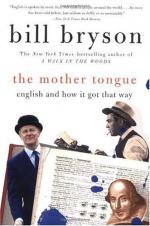|
This section contains 632 words (approx. 2 pages at 400 words per page) |

|
Chapter 4 The First Thousand Years Summary and Analysis
Bryson traces the development of English on the island of what is now the United Kingdom. Under Roman occupation, the Celtic tribes control much of the island. After the Romans leave England in A.D. 450, several Germanic tribes migrate to the island. The Angles, Jutes, and Saxons settle in England over several generations. The Angle tribe gives the future land of England its name. Compared to the Celts, who are strongly influenced by Roman culture, the Angles are uncultured and illiterate. Much of the information that modern scholars have to work with comes from the Venerable Bede, a monk who writes a book on the History of England. Many words in modern English can be traced to Celtic and Anglo Saxon roots. Written English owes a debt to St. Augustine, who brings Christianity...
(read more from the Chapter 4 The First Thousand Years Summary)
|
This section contains 632 words (approx. 2 pages at 400 words per page) |

|




